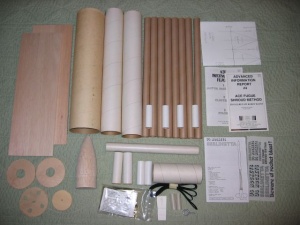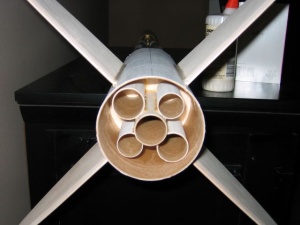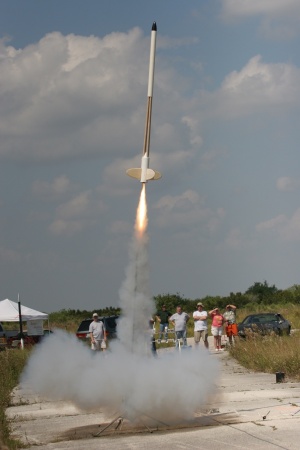U.S. Rockets Berlinetta
U.S. Rockets - Berlinetta {Kit} (1045, K-45) [1979-]
Contributed by Lance Alligood
| Construction Rating: | starstarstarstarstar_border |
| Flight Rating: | starstarstarstarstar |
| Overall Rating: | starstarstarstarstar_border |
| Manufacturer: | U.S. Rockets  |

Brief:
The U.S. Rockets (USR) Berlinetta is described in the instruction manual as a
"large fantasy sport rocket". There is no doubt that it has a unique
look to it. In particular, there are 4 elements that make this kit stand out:
- Large elliptical fins.
- Four 24mm tubes that not only connect the upper and lower half of the rocket but the ejection gasses are routed through them for recovery.
- USR's shroud technique for closing up the aft section of the rocket.
- Clustered motor mount. There are three 29mm MMTs and two 24mm MMTs. Only the central 29mm tube is routed into the rocket for ejection.
Construction:
The kit has the following parts:
- 1 BNC-26 balsa nose cone
- 2 BT-26-18 body tubes
- 1 TC-26-6 tube coupler
- 1 PP-26 bulkhead
- 8 BT-9-17 body tubes
- 4 CT-9-3 coupler tubes
- 1 BT-39-17 body tube
- 2 CR-39-11 centering rings
- 1 CB-39-4 cluster bulkhead
- 1 BT-11-12 motor tube
- 2 BT-11-4 motor tubes
- 2 BT-9-3 motor tubes
- 2 balsa sheets, 6" x 18" x 1/4"
- 2 LL-1/2-2 launch lugs (1/2" diameter)
- 1 SC-9 elastic shock cord (9' x 1/2")
- 1 SCM-2 paper shock cord mount
- 1 SE-1 screw eye
- 1 PAR-30 mylar parachute
- Peel 'n' stick decal sheet
- Instruction manual
- Advanced Information Report (AIR) #3 -- Motor Installation, Clustering, and Staging
- Advanced Information Report (AIR) #4 -- ACE Fugue Shroud Method
- Shroud template and fin pattern sheet

This build was a bit of a collaboration between Jerry Irvine and me. The Berlinetta design has been around for over 20 years and he asked me to assist him in modernizing the build. I knew as soon as I opened the box that this was going to be a really challenging build. USR doesn't arbitrarily throw out skill level 4s for their kits. A USR design has to earn it and the Berlinetta is worthy of such a label. Also, USR recommends aliphatic resin (yellow wood glue) for the construction of their kits. I heartily endorse the use of this glue as well. Also, for best adhesion, sanding the tubes with 220 grit sandpaper anywhere that glue is applied will produce a noticeably stronger bond. With such a long, lightweight kit, any additional strength that can be had is a very good idea.
The build starts with cutting the 4 fins from the large pieces of balsa stock. A sharp knife, either a X-Acto or (my personal preference) a razor utility knife is required to cut the downright mammoth elliptical fins. Although little additional information is given, there is a sketch suggesting that you can use some of the leftover balsa for strakes on the fins. I considered adding them but ultimately passed. The fins were beveled with a sanding block and 150 grit sandpaper followed by 320 grit sandpaper to get everything feeling smooth.
Both the large diameter tube and long 29mm motor tube were marked every 90 degrees with lines running the length of the tubes. A line was marked halfway between one pair of fin lines for mounting the rail buttons. (I used rail buttons instead of the launch lugs included with the kit.)
 The 29mm
motor tube was scuffed with 320 grit sandpaper so that the 4 short motor tubes
can be glued on. I started by gluing the two 29mm tubes on 1/2" from one
end of the central tube. I laid all 3 tubes on a table and allowed them to dry
flat to ensure they are all lined up properly. The 24mm motor tubes had to
follow careful placement and dry one at a time. All joints were given generous
fillets.
The 29mm
motor tube was scuffed with 320 grit sandpaper so that the 4 short motor tubes
can be glued on. I started by gluing the two 29mm tubes on 1/2" from one
end of the central tube. I laid all 3 tubes on a table and allowed them to dry
flat to ensure they are all lined up properly. The 24mm motor tubes had to
follow careful placement and dry one at a time. All joints were given generous
fillets.
The centering rings came next. One was slid all the way onto the central tube until it rested on the forward end of the 29mm side tubes. Fillets of glue were put on all points where the centering ring touched paper tubing. The forward CR was glued on 1/2" from the forward end of the central motor tube. The assembly was set aside for the time being.
Next up was definitely the hardest part of the entire build: making the shroud. While I have built several USR kits using this technique (El Lubbo, Weightlofter, and the Sentra SRB 2.7), this one was particular challenging because it not only had a shroud that came to a point (like a nose cone) but also has openings cut in it to route four 1" diameter tubes to the forward section of the rocket. Extreme amounts of patience along with a lot of cutting a small amount and test fitting was required here for a smooth fit. Before I could even get around to cutting the shroud though, I had to actually design it. I had an original scan of the shroud but it needed some work to make this technique work. I spent time in a vector-based graphics program on the computer to create a shroud with the correct dimensions.
 With the
shroud cut, it's time to put together the vent tube assembly. The vent tubes
are formed by gluing the 17" 1" diameter tubing together in pairs
with the 4 couplers. There are 5 holes in the cluster bulkhead. The center hole
is much smaller than the four outer holes and I used a very short length of
1/4" dowel to plug it. (It was handy, easy to implement, and just the
right size although the instructions suggest just using glue or epoxy to fill
it.) I then used a ruler to draw line across the bulkhead so that it
intersected 2 of the larger holes. I drew another line perpendicular to the
first and intersecting the third and fourth holes. I did a wrap of masking tape
around one end of the 4 vent tubes while they were held in a 2x2 layout and
making sure that the tubes all lined up together. Standing the tubes up on end,
I placed the ends without the tape on the bulkhead so that each tube could be
placed over one of the 4 holes in the bulkplate. I used some masking tape to
hold each tube in place. With all 4 tubes lined up and taped to the cluster
bulkhead, I put a good fillet of glue at the tube-bulkhead joint and gave it
plenty of time to dry.
With the
shroud cut, it's time to put together the vent tube assembly. The vent tubes
are formed by gluing the 17" 1" diameter tubing together in pairs
with the 4 couplers. There are 5 holes in the cluster bulkhead. The center hole
is much smaller than the four outer holes and I used a very short length of
1/4" dowel to plug it. (It was handy, easy to implement, and just the
right size although the instructions suggest just using glue or epoxy to fill
it.) I then used a ruler to draw line across the bulkhead so that it
intersected 2 of the larger holes. I drew another line perpendicular to the
first and intersecting the third and fourth holes. I did a wrap of masking tape
around one end of the 4 vent tubes while they were held in a 2x2 layout and
making sure that the tubes all lined up together. Standing the tubes up on end,
I placed the ends without the tape on the bulkhead so that each tube could be
placed over one of the 4 holes in the bulkplate. I used some masking tape to
hold each tube in place. With all 4 tubes lined up and taped to the cluster
bulkhead, I put a good fillet of glue at the tube-bulkhead joint and gave it
plenty of time to dry.
Once the vent tube assembly was dry, I removed all of the masking tape and did a dry fit of the assembly inside the shroud. (While the angle of the tubes is slight, they did not require any trimming to get them to the proper angle and they naturally wanted to return to that position even when the tape was removed!) Satisfied with the fit, I removed the vent tube assembly and began to glue the shroud together. When I built my El Lubbo, I used strips of paper inside the shroud to increase the strength of the shroud without greatly increasing its weight. I did the same thing here with the Berlinetta.
The upper section was connected to the rocket in pieces as well. To connect the first tube, I made marks at 3" from the end of the 4 vent tubes. When I did a dry fit of the upper tube, it came to a comfortable rest right on my marks. I put a couple wraps of masking tape around the vent tubes to create a resting point for the upper tube. A ring of glue inside the upper tube and then I slid it into place and let it dry with the rocket standing up. After it had time to dry, I used a popsicle stick to aid in putting some more glue along the vent tubes-upper tube joint and let the rocket dry upside-down this time.
The motor mount was then glued into place. The instructions strongly suggest lining up the motors with the fin lines. The entire assembly is pushed up until the central 29mm tube is flush with the end of the body tube.
I prefer my rockets to have a payload section in case I want to carry an altimeter or payload so I deviated from the instructions slightly by making a bulkplate from 1/8" plywood and gluing it to the 2.7" coupler tube and attaching the screw eye. This assembly was glued halfway into the remaining 2.7" body tube and set aside to dry. A little masking tape was required to friction fit the nose cone into the open end of the tube.
Coming down the home stretch, it was time to glue on the massive balsa fins. The "double glue" method was used to initially attach the fins. I applied several thin layers of yellow glue fillets, which noticeably reduced the flex at the fin-body tube joint.
While the kit comes with two 1/2" launch lugs, I've been partial to rail buttons ever since I've been in MPR/HPR. I therefore left the lugs off and used a couple of rail buttons, one at the base of the rocket and another just aft of the shroud and vent tubes.
Finishing:
I never got around to finishing the Berlinetta. I found it just too cumbersome
to paint it. Also, while storing it (before launching it for the first time),
one of the fins was accidentally broken. I had some scrap 3/16" balsa
(although before I attached it, I thought it was the same thickness as the
Berlinetta's fins) that was big enough to replace the original fin. That
difference in fin thickness proved to make a difference during flight.
Construction Rating: 4 out of 5

Flight:
I loaded an AeroTech H128W-S into the central motor tube for the first flight
of the Berlinetta. The large elliptical fins made for a slow, majestic flight.
Thrust was forceful enough to cause one fin (the one that I previously
replaced) to be ripped off. The fin was later recovered but it's pretty obvious
that 3/16" balsa cannot withstand the same forces that 1/4" balsa
can. The rocket continued upward without any noticeable change in direction
during the coast phase. I will be replacing the fin with the appropriate
thickness of balsa.
Recovery:
According to U.S. Rockets, wadding is optional with Berlinetta. This is because
the direction of the ejection charge is deflected at least a couple of times as
well as traveling nearly 4 feet before reaching the parachute and shock cord. I
did not use any wadding to protect the 36" Top Flite nylon parachute. I
chose the relatively large chute size because I wanted the Berlinetta to
recover gently and reduce the chance of damage to the (remaining three) fins.
With moderate winds, it drifted further than I would have liked. A 30"
chute would have been adequate for recovery. Ejection occurred right at apogee
and there was no (additional) damage to the rocket from recovery.
Flight Rating: 5 out of 5
Summary:
The USR Berlinetta is truly a unique large model rocket (not necessarily a high
power rocket). The build is extremely challenging with the clustered motor
mount, shroud, and canted tubes. This kit is not for beginners or for those
looking for a simple, quick build.
PROs:
- Unique look and design for a large model rocket.
- Challenging techniques used throughout the entire build.
- Clustered motor mount.
- Can fly on a wide range of motors due to overall light weight.
CONs:
- Tremendous fin span and overall length (complicated by the inability to break the rocket down for easier transportation and storage).
- There is only enough 4" diameter tubing to create 1 shroud assembly, so there is little room for error!
Overall Rating: 4 out of 5
 |
 |
Flights
 |
 |
John Eric Thompson (January 28, 2020)
I am building the kit now and it is pretty cool to put together :-)
John Eric Thompson (February 25, 2020)
The kit was fun to build. I am getting it ready for the next clubs launch.
 |
 |
J.I. (May 11, 2006)